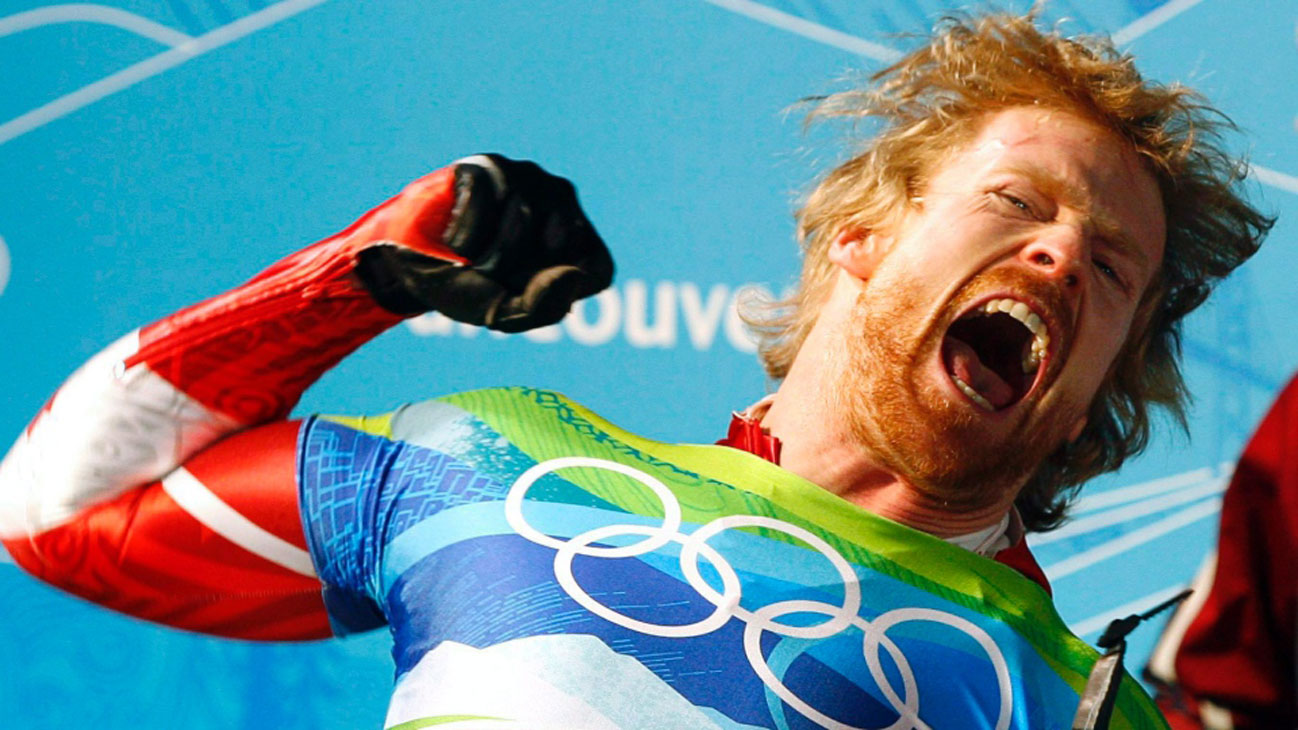At the 2010 Vancouver Winter Games, Jon Montgomery cemented his place amongst Canada’s icons. After earning a gold medal in the skeleton, his celebratory, beer-drinking walk through the Whistler Village captured the hearts of Canadians across the nation.
Jon joined CBC Sports Oral Histories to reflect on this life-changing night. He gave a play by play of every moment leading up to Gold, and how he made every second — every hundredths of a second — count.
From Auctioneer to Skeleton Racer
Jon’s Olympic journey started much later in life than many of his fellow Olympians. He was an auctioneer who worked near Canada Olympic Park, a ski hill and multi-purpose training and competition facility located in Calgary. One day on his way home, he happened to witness a skeleton race and immediately fell in love with this niche sport.
Years of hard work and perseverance led Jon to his Olympic victory, but he never lost sight of who he was and why he fell in love with the sport in the first place.
“It’s just sport,” Jon said to CBC, “and it should be fun, and it should be inspirational … work hard, chase your dreams, and don’t take any of the other stuff too seriously.”
In his interview, Jon was joined by Nathan Cicoria, Bobsleigh Canada Skeleton high-performance director and his coach, Kelly Forbes. Kelly said:
“Jon was his own guy. He didn’t fall into any trap of, like, ‘you have to do this’ and ‘you have to do this to become an Olympic athlete,’ or let alone an Olympic gold medallist. He enjoyed the [World Cup] tour and after the races were done, we would celebrate with other [athletes] from other countries.”
Nathan said, “He’s very disciplined, very regimented, and if it means blowing off some steam or having a late night, that was fine. It may have seemed like it was coming off as irresponsible or a little bit off-script, but it wasn’t.”
The 2010 Vancouver Olympics
Kelly said it was important to allow Jon to be himself at the Olympics, especially in light of the tragic death of fellow skeleton athlete Nodar Kumaritashvili. He was killed in a training accident on the day of the opening ceremony.
“The luge accident was really hard on the team,” Nathan said. “I remember having a lot of conversations with the team and our sports psych[ologist]s.”
In an Olympic skeleton competition, athletes are ranked based on their combined time of four runs down the same track. On the first day, Jon came out second after two runs — 26-hundredths of a second behind first place. From the article:
Jon: We almost couldn’t overcome that. But you always know in your heart of hearts that anything is achievable, anything is overcome-able. And if that’s not in Webster’s Dictionary yet, it should be.
Kelly: We were going to bed that night and reviewed his runs and his starts. He’s preparing his sled for the next two runs the next day and I said, ‘Jon, to be honest, just run that thing as far as you can.’
Jon: I was able to get splits that were put up [online] that gave me insight that we didn’t have. Nobody was giving me a splits chart that night. I basically stumbled upon it, did the math and found out that I got left behind in corner four.
It turned out that going in a little bit later would maybe allow me not to bleed as much energy at the beginning of that corner.
It wasn’t anything that my team had available. It wasn’t anything that I had special access to because the track was ours. This was born out of just the everyday material that was available to the public.
On day two of his Olympic games, Martins Dukers of Latvia sat in first place and set a track record on his first run of the day, third run overall. Now Jon was faced with not only the need to go faster but to also set a track record.
Jon: [Dukurs] set a track record. And I’m like, ‘Are you kidding me? I’ve got to overcome a track record now?’
So I came down and I did. I set the track record by eight-hundredths of a second, and that, I know for a fact, is by that change of entrance into corner four.
Going into his fourth run, he trailed first place by 18-hundredths of a second.
Jon: I pushed as hard as I could and nearly destroyed every opportunity I had because I pushed so hard. … It [still] gives me heart palpitations every time I see my sled wiggle in that groove on that final descent. It was my fastest push of the competition by a pretty good bit.
I was saying to myself, ‘It’s got to be enough. That’s gotta be enough.’ And [Dukurs] came down and he was having another smoker and made one small error, and that was the fateful error.
Jon came out seven-hundredths of a second ahead, which is “half a sled length, the blink of an eye,” he said.
Celebrating Gold with a Toast to Canada
Post-race was a blur with Jon saying, “It was like I’d stuck my big toe in a light socket and the energy was now pumping, coursing through my body and radiating out my pumping fist.”
After taking a ton of photos with family and friends and some anti-doping tests, Jon finally made his way to CTV’s broadcast stage. It was this infamous moment that magnified Jon’s win on a global stage as he celebrated his win as any Canadian would celebrate a good moment — with a beer.
Keara Brennan was sitting in a pub in the Whistler Village when she hears the uproar after Jon’s win. Seeing the jug of beer in front of her, she thought that this guy would need a beer at this point to get through a slew of media interviews. She grabbed the jug, pushed through the crowd and handed Jon the beer over an RCMP officer.
Jon: I didn’t take two seconds to think about it because it was almost like Manifest Destiny.
I was like, ‘Oh, I’m thirsty. Wouldn’t it be nice to grab a pint in one of these places before we go to this interview?’ And it was almost like [angel voices] in that moment. If it could have had an aura around it, it did.
CBC Sports: Everybody starts singing ‘O Canada.’ He takes a swig of beer, and it’s just who he was. It’s a totally Canadian thing that was never planned.
Keara: Nobody said anything. To be honest, I got the impression that the cops loved it. I think they were going with the flow of just a great moment.
Jon: I do remember thinking to myself, ‘You were on the verge of having this pitcher slip out your grip and looking terrible in front of at least six or seven people at the bar right now.’
Kelly: And he gives it to us as well as he keeps on walking, and I think Nathan had a swig and I’m not a big drinker and I had a swig.
Nathan: I’m like, ‘Is this a good thing? Should he be carrying beer?’ I looked at Kelly and we just kind of shrugged and we’re like, ‘You try and get it away from him, that beer is not going anywhere.’
Jon: You don’t realize in that moment that you’re connected with and in front of, two million, I believe, of my brothers and sisters that were in party mode at that point in time and I wasn’t drinking alone.
I was drinking with Canada.
Right then, Canada fell in love with Jon as he brought his boisterous personality to CTV’s broadcast stage. Today, Jon brings that same passion, spirit, and sense of humour to the stage as a keynote speaker and also as the host of The Amazing Race Canada. He has helmed that hit television show since it premiered in 2013.
Nathan added that while the beer was an iconic moment, Jon’s fist-pumping at the end of the race when he knew he’d won, “that’s Jon’s medal for me,” he said.
Read more from CBC Sports Oral Histories.
Interested in learning more about Jon Montgomery and what he can bring to your next event as a keynote speaker? Email us at [email protected].




